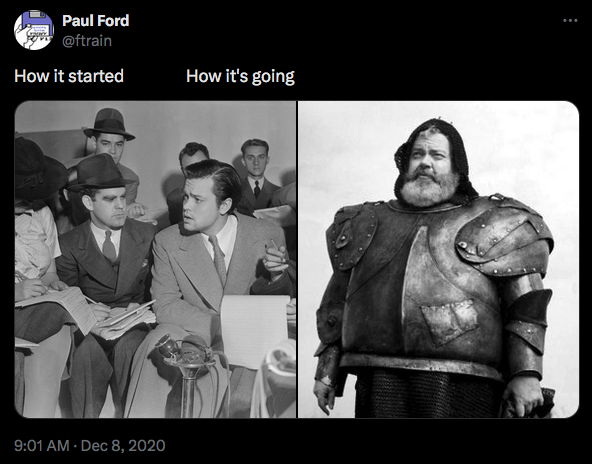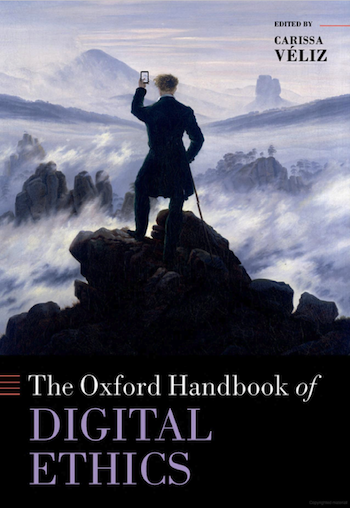How it’s going in tech – without ethics
By Mark Hurst • July 12, 2024
There’s an old meme template called “how it started, how it’s going.” In the two-panel design, the first image shows something or someone in an earlier state; the second shows how things ended up. Here’s an example by Paul Ford from a few years ago, featuring Orson Welles:

My Techtonic episode this week was inspired by “how it started, how it’s going” (listen / see episode links.) I played a series of clips from past shows in which the guest warned of a developing threat – and then I read current news stories showing that the warning did, in fact, come true.
Example: on the Feb 12, 2024 Techtonic, astronomer Sam Lawler described the risks associated with Elon Musk’s Starlink satellites as they reach the end of their service life and re-enter the atmosphere. Most (though not all) satellites will burn up before raining down on people below: as each is a truck-sized hunk of metal, what does that do to our atmosphere? We’re not sure, but it can’t be good.
“I’m not an atmospheric scientist,” Lawler told me. “Very few people have started to study this.” She went on to say:
Most of the mass of these satellites is metals, right? What is that going to do? We don’t actually know. We have no idea. There’s some indication that it could make alumina, which is ozone depleting.
If that interview five months ago was “how it started,” here’s “how it’s going”: put simply, Lawler was right. Two weeks ago Scientific American reported that Satellite Mega Constellations Could Jeopardize Ozone-Hole Recovery (June 25, 2024), quoting a new research paper with this conclusion:
Pollution from skyrocketing numbers of satellites burning up in Earth’s atmosphere could threaten our planet’s protective ozone layer.
The depletion of the ozone layer is just one of Big Tech’s effects on the world. The explosive growth of giant data centers is another issue, as AI training uses huge amounts of electricity and water. (That was another warning on a past Techtonic, from the Dec. 11, 2023 interview with Guillaume Pitron.) How’s that problem going? Google just announced that its emissions have climbed nearly 50% in five years due to AI energy demand. Tech companies claimed for years that they intended to “change the world,” and now they have.
Get Mark Hurst’s weekly writings in email: Subscribe. (Or join Creative Good.)
Sign up for this newsletter.
It didn’t start this way. During the early years of the web, many of us were actually optimistic that tech could change things for the better. Hardly a fantasy, it seemed more than possible due to the example of one particular tech company. Ted Gioia writes (July 3, 2024):
When I first came to Silicon Valley at age 17, the two leading technologists in the region were named William Hewlett and David Packard. They used their extra cash to fund schools, museums, and hospitals — both my children were born at the Lucile Packard Children’s Hospital — not immortality machines, or rockets to Mars, or a dystopian Internet of brains, or worshiping at the Church of the Singularity. . . .
Bill Hewlett had more wisdom than ego. He invested in the community where he lived — not the Red Planet. Instead of promulgating social engineering schemes, Hewlett and Packard built a new engineering school at their alma mater, and named it after their favorite teacher. They wouldn’t recognize Silicon Valley today.
If that’s how Silicon Valley started, here’s “how it’s going,” from the New York Times (July 11, 2024):
Mr. Musk, 53, has directed SpaceX employees to drill into the design and details of a Martian city . . . One team is drawing up plans for small dome habitats, including the materials that could be used to build them. Another is working on spacesuits to combat Mars’s hostile environment, while a medical team is researching whether humans can have children there. Mr. Musk has volunteered his sperm to help seed a colony . . .
In the examples of Bill Hewlett (generous and community-minded) and Elon Musk (deluded and self-important) we can track the arc of Silicon Valley. The underlying shift has to do with a topic that deserves a lot more attention: ethics.
Get Mark Hurst’s weekly writings in email: Subscribe. (Or join Creative Good.)
Sign up for this newsletter.
We need more digital ethics
I recently spoke on Techtonic with Carissa Véliz (listen / see episode links). Véliz is the editor of The Oxford Handbook of Digital Ethics, a large tome with dozens of essays about how to apply ethics to various digital domains: persuasive design, social-media shaming, brain uploading, and much more.

Far from being an abstract or dusty notion, digital ethics is a topic that is as urgently needed as it is absent from the C-suite of too many tech companies. As you can hear in our interview, the widespread lack of ethics has led to platforms that spy on, manipulate, and exploit all of us – especially kids – for the enrichment of a few. Meantime, the tech industry barrels forward into AI with barely a thought about how it will affect the world.
What happens from here? I doubt if we can change tech to work for good, ethical ends – at least not in the near future. But perhaps we could set the bar lower: could we encourage tech companies to stop actively harming people?
My friend Minter Dial and I talked about this possibility on his July 7, 2024 podcast. During the conversation, I challenge the tech industry to stop actively exploiting customers, their families, and their communities. Stop actively exploiting workers. Stop actively harming the environment – and profiting off of these harms.
My work at Creative Good is devoted to this idea, that we can – and should – and must – try to make tech better. This is not an abstract fantasy but a very real possibility. If tech companies would just stop doing the worst, we might have a chance to look for a way to do things right.
If this resonates with you, please join my Creative Good community.
Creative Good members can post a comment on this column. If you’re not a Creative Good member, join us!
Get Mark Hurst’s weekly writings in email: Subscribe. (Or join Creative Good.)
Sign up for this newsletter.
Until next time,
-mark
Mark Hurst, founder, Creative Good – see our services or join as a member
Email: mark@creativegood.com
Listen to my podcast/radio show: techtonic.fm
Subscribe to my email newsletter
Sign up for my to-do list with privacy built in, Good Todo
On Mastodon: @markhurst@mastodon.social
- – -